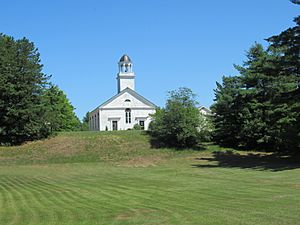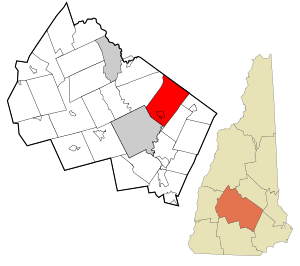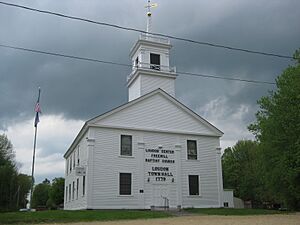Loudon, New Hampshire facts for kids
Quick facts for kids
Loudon, New Hampshire
|
||
|---|---|---|

Loudon Congregational Church north of the village center
|
||
|
||

Location in Merrimack County and the state of New Hampshire.
|
||
| Country | United States | |
| State | New Hampshire | |
| County | Merrimack | |
| Incorporated | 1773 | |
| Villages |
|
|
| Area | ||
| • Total | 46.72 sq mi (121.00 km2) | |
| • Land | 46.16 sq mi (119.55 km2) | |
| • Water | 0.56 sq mi (1.45 km2) 1.20% | |
| Elevation | 371 ft (113 m) | |
| Population
(2020)
|
||
| • Total | 5,576 | |
| • Density | 121/sq mi (46.6/km2) | |
| Time zone | UTC-5 (Eastern) | |
| • Summer (DST) | UTC-4 (Eastern) | |
| ZIP code |
03307
|
|
| Area code(s) | 603 | |
| FIPS code | 33-43380 | |
| GNIS feature ID | 0873652 | |
Loudon is a town located in Merrimack County, New Hampshire, in the United States. In 2020, about 5,576 people lived here. Loudon is famous for being the home of the New Hampshire Motor Speedway, a big race track.
The main part of town, called the Loudon census-designated place, is where about 711 people lived in 2020. This area is found along the Soucook River and at the end of New Hampshire Route 129.
Contents
History of Loudon
The town of Loudon was officially created on January 23, 1773. It was signed into existence by Governor John Wentworth. Loudon was formed using land that used to be part of Canterbury.
The town was named to honor John Campbell, 4th Earl of Loudoun. He was a Scottish soldier who led British military forces in North America during the French and Indian War. Lord Loudoun also helped create a special group of colonial soldiers called Rogers' Rangers.
One of Lord Loudoun's helpers, John Loudon McAdam, invented a new way to build roads. This method, called macadam, made roads stronger and less muddy than older dirt roads.
Geography and Location
Loudon covers a total area of about 121 square kilometers (46.7 square miles). Most of this area, about 119.5 square kilometers (46.1 square miles), is land. The remaining 1.4 square kilometers (0.5 square miles) is water, making up about 1.45% of the town's total area.
The highest point in Loudon is near its northern border. It's an unnamed hill just north of a place called Sabattus Heights. This spot reaches about 1050 feet (320 meters) above sea level.
Neighboring Towns
Loudon shares its borders with several other towns:
- Gilmanton (to the north)
- Barnstead (to the northeast)
- Pittsfield (to the east)
- Chichester (to the southeast)
- Pembroke (to the south)
- Concord (to the southwest)
- Canterbury (to the west)
Population Changes in Loudon
| Historical population | |||
|---|---|---|---|
| Census | Pop. | %± | |
| 1790 | 1,084 | — | |
| 1800 | 1,279 | 18.0% | |
| 1810 | 1,472 | 15.1% | |
| 1820 | 1,694 | 15.1% | |
| 1830 | 1,642 | −3.1% | |
| 1840 | 1,640 | −0.1% | |
| 1850 | 1,552 | −5.4% | |
| 1860 | 1,638 | 5.5% | |
| 1870 | 1,282 | −21.7% | |
| 1880 | 1,221 | −4.8% | |
| 1890 | 1,000 | −18.1% | |
| 1900 | 960 | −4.0% | |
| 1910 | 838 | −12.7% | |
| 1920 | 690 | −17.7% | |
| 1930 | 801 | 16.1% | |
| 1940 | 920 | 14.9% | |
| 1950 | 1,012 | 10.0% | |
| 1960 | 1,194 | 18.0% | |
| 1970 | 1,707 | 43.0% | |
| 1980 | 2,454 | 43.8% | |
| 1990 | 4,114 | 67.6% | |
| 2000 | 4,481 | 8.9% | |
| 2010 | 5,317 | 18.7% | |
| 2020 | 5,576 | 4.9% | |
| U.S. Decennial Census | |||
According to the census from 2010, there were 5,317 people living in Loudon. These people made up 1,966 households and 1,459 families.
About 34.3% of the households had children under 18 living with them. Most households, 62.0%, were married couples living together. About 23.2% of the population was under 18 years old. The median age in Loudon was 41.9 years.
Education in Loudon
Students in Loudon attend different schools depending on their grade level:
- Younger children, from kindergarten through fifth grade, go to Loudon Elementary School.
- Students in grades 6, 7, and 8 attend Merrimack Valley Middle School. This school is located in Penacook.
- Older students, from grades 9 through 12, go to Merrimack Valley High School. This high school is also in Penacook.
Local News and Media
The Loudon Communications Council publishes a monthly newspaper called The Loudon Ledger. This newspaper is sent for free to homes in town. You can also find digital versions of the newspaper online on the Town of Loudon website. The online archive includes issues from October 2005 onwards, plus the July 2005 issue.
Fun Places to Visit in Loudon

Loudon is home to the famous New Hampshire Motor Speedway. This is a very popular place for car and motorcycle races!
Some of the big races held here include:
- The Ambetter 301 in the NASCAR Cup Series.
- The ROXOR 200 in the NASCAR Xfinity Series.
- The Loudon Classic, which is known as "America's Oldest Motorcycle Race."
See also
 In Spanish: Loudon (Nuevo Hampshire) para niños
In Spanish: Loudon (Nuevo Hampshire) para niños
 | William Lucy |
 | Charles Hayes |
 | Cleveland Robinson |


